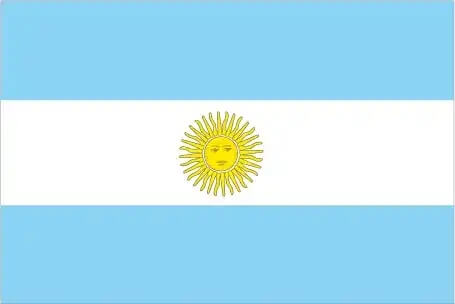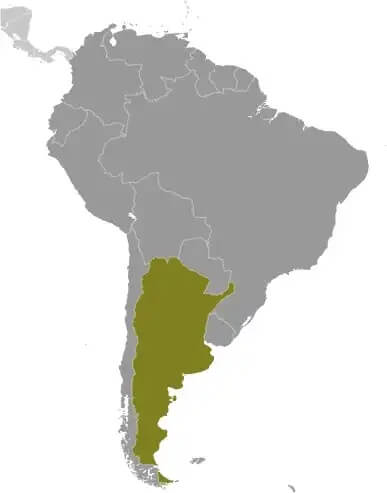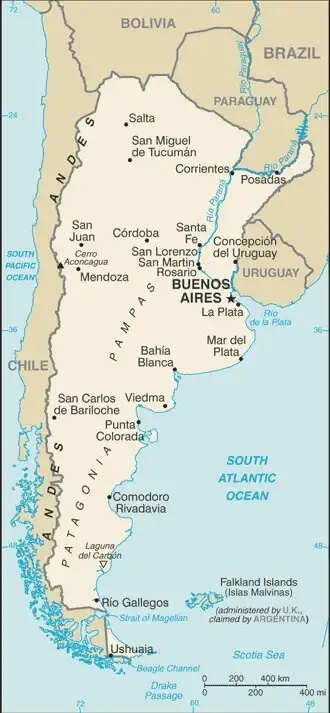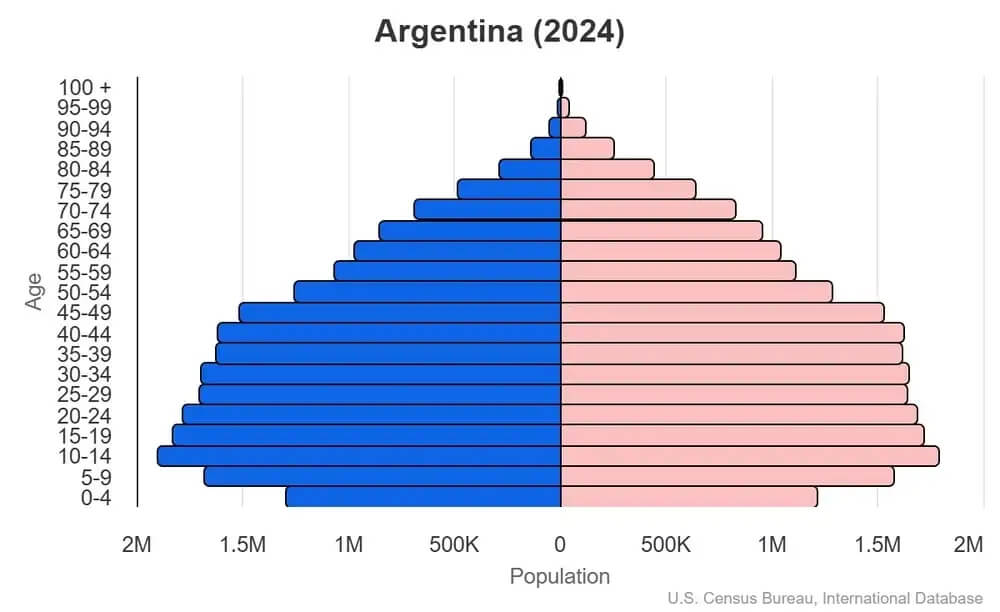World Book
Argentina
World Book Index
75


With a score of 75, the country is ranked 46th out of 158 countries in the World Book ranking. (more information)
Introduction
In 1816, the United Provinces of the Río de la Plata declared their independence from Spain. After Bolivia, Paraguay, and Uruguay left, the area that remained became Argentina. European immigrants heavily shaped the country's population and culture.
Neighboring countries
Bolivia - Brazil - Chile - Paraguay - Uruguay
Geography
Area
total: 2,780,400 sq km
land: 2,736,690 sq km
water: 43,710 sq km
Climate
mostly temperate; arid in southeast; subantarctic in southwest
Natural resources
fertile plains of the pampas, lead, zinc, tin, copper, iron ore, manganese, petroleum, uranium, arable land
People and Society
Population
total: 46,994,384 (2024 est.)
Ethnic groups
European (mostly Spanish and Italian descent) and Mestizo (mixed European and Indigenous ancestry) 97.2%, Indigenous 2.4%, African descent 0.4% (2010 est.)
Languages
Spanish (official), Italian, English, German, French, indigenous (Quechua, Guarani, Mapudungun)
Religions
Roman Catholic 62.9%, Evangelical 15.3% (Pentecostal 13%, other Evangelical 2.3%), Jehovah's Witness and Church of Jesus Christ 1.4%, other 1.2% (includes Muslim, Jewish), none 18.9% (includes agnostic and atheist), unspecified 0.3% (2019 est.)
Population growth rate
0.79% (2024 est.)
Government
Government type
presidential republic
Capital
name: Buenos Aires
Executive branch
chief of state: President Javier Gerardo MILEI (since 10 December 2023)
head of government: President Javier Gerardo MILEI (since 10 December 2023)
Diplomatic representation in the US
chief of mission: Ambassador Alejandro (Alec) Carlos Francisco OXENFORD (since 11 June 2025)
Diplomatic representation from the US
chief of mission: Ambassador (vacant); Chargé d'Affaires Heidi Gómez RÁPALO (since 11 July 2025)
Economy
Economic overview
large diversified economy; financial risks from debt obligations, rapid inflation, and reduced investor appetites; resource-rich, export-led growth model; increasing trade relations with China; G20 and OAS leader; tendency to nationalize businesses and under-report inflation
Real GDP (purchasing power parity)
$1.213 trillion (2024 est.)
$1.234 trillion (2023 est.)
$1.255 trillion (2022 est.)
Real GDP per capita
$26,500 (2024 est.)
$27,100 (2023 est.)
$27,600 (2022 est.)
Exports
$96.899 billion (2024 est.)
$82.947 billion (2023 est.)
$102.928 billion (2022 est.)
Exports - partners
Brazil 18%, USA 9%, Chile 8%, China 8%, India 4% (2023)
Exports - commodities
soybean meal, corn, trucks, soybean oil, crude petroleum (2023)
Imports
$79.999 billion (2024 est.)
$92.3 billion (2023 est.)
$97.399 billion (2022 est.)
Imports - partners
Brazil 23%, China 20%, USA 12%, Paraguay 5%, Germany 4% (2023)
Imports - commodities
soybeans, vehicle parts/accessories, refined petroleum, natural gas, cars (2023)
Human Development Index
The country's Human Development Index (HDI) is 0.865, ranking it 47th out of 193 countries tested. (more information)
World Happiness Report
The World Happiness Report ranked the country 33rd out of 158 countries tested with a score of 6.469. (more information)



